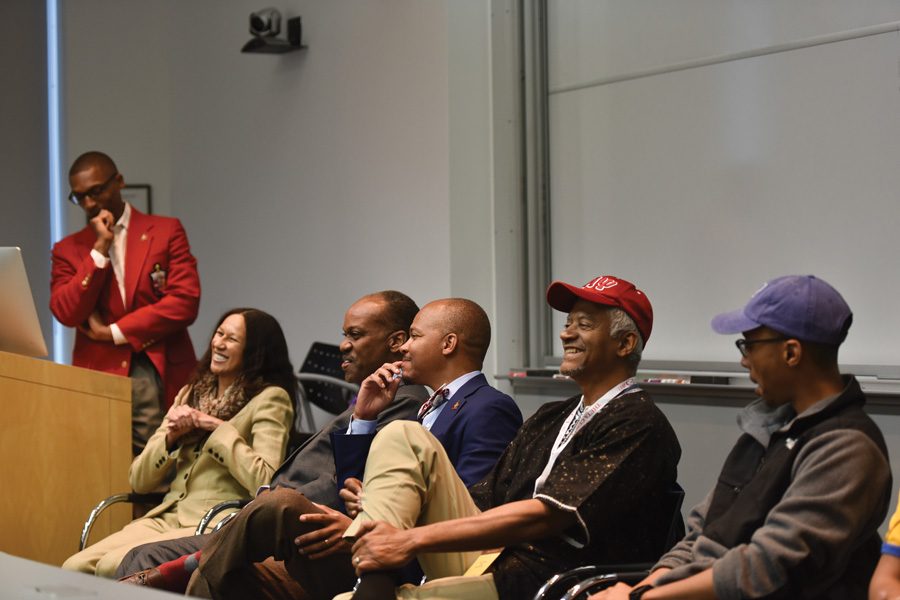NU’s oldest historically black fraternity holds panel on relevancy of Greek life
Jeffrey Wang/ Daily Senior Staffer
Panel members talk about the current state of black Greek life on campus and its relevancy. The talk kicks off a series of events held to celebrate the 100th anniversary of Northwestern’s Kappa Alpha Psi, which is the oldest historically black fraternity on campus.
April 14, 2017
Students and alumni members of historically black fraternities and sororities discussed the relevancy of Greek life as well as the role of black Greek life at a predominantly white institution during a panel Thursday.
The event, titled “Why Black Greeks Matter,” kicks off a series of events organized by the Theta Chapter of Kappa Alpha Psi, the oldest historically black fraternity at Northwestern. The panel is part of programming to celebrate the chapter’s 100th anniversary. Panelists shared their experiences as black individuals in Greek life, and how they benefited from the networks they made within the community.
Panelist Jeannine Turner (Weinberg ’88), who joined Alpha Kappa Alpha — a historically black sorority — at NU, said her chapter provided her with a sense of “camaraderie,” which she had been missing since she had moved to NU without any family or high school friends.
Kappa Alpha Psi member Alonzo Mayo, who attended the event, said he agreed Greek life provides a family-like environment for its members.
“I grew up in a very tight-knit family, so when I came here kind of by myself, I didn’t really have anybody I could feel comfortable with,” the Weinberg sophomore said. “The fraternity gave me above and beyond what I expected.”
Panelist John Trimble (McCormick ’71), who joined Kappa Alpha Psi at NU, also said black Greek life is a symbol of black empowerment, particularly when he attended college in 1967. With the rise of historically black chapters on college campuses, he said the “drastic change” was a significant statement of the importance of emphasizing black culture.
“It was part of the broader movement in terms of empowerment,” he said. “All of this was an act of black consciousness … and I’m glad that there are others today that follow that because this was a revolutionary act.”
Despite these efforts to increase the presence of historically black fraternities and sororities on campuses, there are still difficulties being part of black Greek life at predominantly white institutions, said Loyola University Chicago junior and panelist Gianni Cook.
Cook, a member of Kappa Alpha Psi, said little has changed over the past few decades. Stricter regulations have been put in place by universities under the name of “risk management” to make the organization of people of color more difficult, he said.
“There might not be as many cases of overt racism or things like that,” Cook said. “But there is just as much of a presence of ‘We don’t want you,’ whether or not that is known.”
SESP sophomore and panelist Ashley Woods, president of Sigma Gamma Rho, a historically black sorority, said her chapter’s visibility is negatively impacted by the University’s regulations.
The sorority does not have its own house on campus and has faced difficulties securing a location in conversations with administrators, Woods said.
Despite these difficulties, Turner emphasized the need to preserve historically black sororities and fraternities to preserve their history.
“It is incredibly important because if you’re not around to tell your history, believe me no one else is going to tell it for you,” she said. “There has to be a way to preserve, to honor and to propagate your history. This organization, this is one of the ways we do that.”
Email: catherinekim2020@u.northwestern.edu
Twitter: @ck_525


